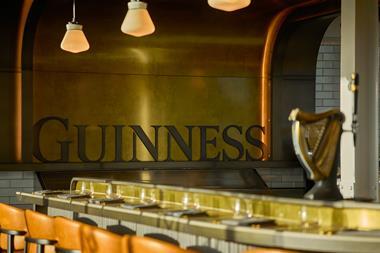Grocery retailers are gaining a reputation for their sophisticated use of brand values, says Steve Crabb
Employer branding has been one of the hottest topics in human resources in recent years. The concept - coined by my fellow columnist in The Grocer, Simon Howard - is extremely powerful.
In essence, it means ensuring that you apply your brand values from one end of your operation to another, so if you offer your customers a fun environment and great service, that’s what your employees should be experiencing, too.
Get the two joined up, and you’ll attract staff who already have the right attitudes to deliver your customer proposition - a win-win scenario and a radical departure from the usual situation where human resources and marketing jealously guard their own turfs, with little communication between them.
This is a risky strategy, though. Companies that over-promise and fail to deliver are likely to alienate their people.
And too many businesses see employer branding simply as a way of attracting scarce staff by exploiting the strengths of their customer brands, without putting in place the cultural changes needed to make ‘end-to-end branding’ a reality.
Fortunately, there are plenty of examples of good practice in the grocery business. Asda, by all accounts, lives its brand values from the boardroom down to the most junior employee. And Tesco pushed the boundaries even further this month with the launch of its ‘Debut’ programme, which is aimed at building the firm’s employer brand among the youngest segments of the labour market.
Instead of resorting to the usual, product-led gimmicks so popular with marketing people who attempt to reach out to the youth market, Tesco decided to invest in some serious research about what young people actually want.
Over a year ago, it commissioned recruitment specialists Bernard Hodes (which already handled the chain’s recruitment advertising), to conduct a major research exercise with more than a thousand 11 to 24-year-olds.
Hodes asked the target group what they thought of the grocery business and Tesco in particular, what they want from their employer, what turns them off, and what Tesco might do that they would find attractive.
Running over three phases, this was one of the most ambitious exercises of its type and, according to Helen Rosethorn, chief executive at Bernard Hodes, the results have forced Tesco to completely rethink its approach to young people and to challenge some deep-seated views.
For example, the research found that young people start forming their views about the careers they want and the employers they’ll consider much earlier than had traditionally been believed.
The resulting Debut initiative sees weekend-working teenagers as future customers and young shoppers as future employees: end-to-end branding at its purest.
Tesco is now offering careers advice for young people, online training and development, financial guidance and a range of job opportunities for college-leavers - as well as the familiar money-off schemes for mobile top-up cards, meals, cinema tickets and travel.
It is testing a new scheme called Debut PASS, which offers undergraduates the chance to work flexible hours to fit in with their study, as well as Clearing House, which enables working students to swap between their home and university stores.
Another trial, Save as You Study, aims to help students plan their finances and create a nest-egg for when they graduate.
Tesco has a well-earned reputation for being at the forefront of intelligent employer branding. It’s not resting on its laurels.
n Steve Crabb is editor of People Management
Employer branding has been one of the hottest topics in human resources in recent years. The concept - coined by my fellow columnist in The Grocer, Simon Howard - is extremely powerful.
In essence, it means ensuring that you apply your brand values from one end of your operation to another, so if you offer your customers a fun environment and great service, that’s what your employees should be experiencing, too.
Get the two joined up, and you’ll attract staff who already have the right attitudes to deliver your customer proposition - a win-win scenario and a radical departure from the usual situation where human resources and marketing jealously guard their own turfs, with little communication between them.
This is a risky strategy, though. Companies that over-promise and fail to deliver are likely to alienate their people.
And too many businesses see employer branding simply as a way of attracting scarce staff by exploiting the strengths of their customer brands, without putting in place the cultural changes needed to make ‘end-to-end branding’ a reality.
Fortunately, there are plenty of examples of good practice in the grocery business. Asda, by all accounts, lives its brand values from the boardroom down to the most junior employee. And Tesco pushed the boundaries even further this month with the launch of its ‘Debut’ programme, which is aimed at building the firm’s employer brand among the youngest segments of the labour market.
Instead of resorting to the usual, product-led gimmicks so popular with marketing people who attempt to reach out to the youth market, Tesco decided to invest in some serious research about what young people actually want.
Over a year ago, it commissioned recruitment specialists Bernard Hodes (which already handled the chain’s recruitment advertising), to conduct a major research exercise with more than a thousand 11 to 24-year-olds.
Hodes asked the target group what they thought of the grocery business and Tesco in particular, what they want from their employer, what turns them off, and what Tesco might do that they would find attractive.
Running over three phases, this was one of the most ambitious exercises of its type and, according to Helen Rosethorn, chief executive at Bernard Hodes, the results have forced Tesco to completely rethink its approach to young people and to challenge some deep-seated views.
For example, the research found that young people start forming their views about the careers they want and the employers they’ll consider much earlier than had traditionally been believed.
The resulting Debut initiative sees weekend-working teenagers as future customers and young shoppers as future employees: end-to-end branding at its purest.
Tesco is now offering careers advice for young people, online training and development, financial guidance and a range of job opportunities for college-leavers - as well as the familiar money-off schemes for mobile top-up cards, meals, cinema tickets and travel.
It is testing a new scheme called Debut PASS, which offers undergraduates the chance to work flexible hours to fit in with their study, as well as Clearing House, which enables working students to swap between their home and university stores.
Another trial, Save as You Study, aims to help students plan their finances and create a nest-egg for when they graduate.
Tesco has a well-earned reputation for being at the forefront of intelligent employer branding. It’s not resting on its laurels.













No comments yet